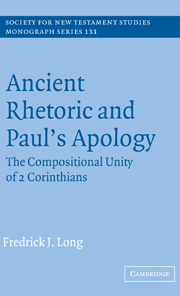Book contents
- Frontmatter
- Contents
- List of figures
- List of tables
- Preface
- List of abbreviations
- 1 An apology for the unity of 2 Corinthians
- Part 1 A survey of ancient forensic discourse
- Part 2 A rhetorical analysis of 2 Corinthians as ancient apology
- 7 The rhetorical exigency of 2 Corinthians
- 8 The rhetorical disposition of 2 Corinthians
- 9 The rhetorical invention of 2 Corinthians
- 10 The rhetoric of 2 Corinthians and the nature of Paul's theology
- Appendix I How the peroratio (12.11–13.10) summarizes 2 Corinthians
- Appendix II Topoi for each subtype of the qualitative stasis
- List of references
- Index of biblical references
- Index of ancient authors and sources
- Subject index
10 - The rhetoric of 2 Corinthians and the nature of Paul's theology
Published online by Cambridge University Press: 12 November 2009
- Frontmatter
- Contents
- List of figures
- List of tables
- Preface
- List of abbreviations
- 1 An apology for the unity of 2 Corinthians
- Part 1 A survey of ancient forensic discourse
- Part 2 A rhetorical analysis of 2 Corinthians as ancient apology
- 7 The rhetorical exigency of 2 Corinthians
- 8 The rhetorical disposition of 2 Corinthians
- 9 The rhetorical invention of 2 Corinthians
- 10 The rhetoric of 2 Corinthians and the nature of Paul's theology
- Appendix I How the peroratio (12.11–13.10) summarizes 2 Corinthians
- Appendix II Topoi for each subtype of the qualitative stasis
- List of references
- Index of biblical references
- Index of ancient authors and sources
- Subject index
Summary
Second Corinthians is Paul's great apology in which he opens wide his heart and wants the Corinthians to do the same (6.11–13). In it Paul defends his perceived inconsistencies while morally educating the Corinthians in matters of forgiveness, faithfulness, and sacrificial service. Paul argued that since God approved his ministry, so should the Corinthians. Although interpreters dispute the apologetic nature of Galatians and portions of 1 Corinthians, I would maintain that Paul in 2 Corinthians leaves little doubt of his intentions (7.2; 12.19). Paul's apology in 2 Corinthians is masterfully on a par with the epideictic rhetoric of 1 Thessalonians (Jewett, 1986) and the deliberative rhetoric in 1 Corinthians (M. Mitchell, 1991). Paul's repertoire is complete.
By investigating 2 Corinthians through Greco-Roman rhetorical theory and practice I have addressed the question of the unity of 2 Corinthians. I have focused primarily on disposition, invention, and exigency. From a methodological viewpoint I hope that this monograph will contribute to the goal of the “complete analysis of New Testament rhetoric,” to use Judge's words (1968, p. 45). I expect that it will initiate further discussion and debate on the nature and character of Pauline rhetoric.
My particular thesis is that Paul deliberately fashioned 2 Corinthians in conformity with forensic practice in the Greco-Roman tradition. Specifically, he was responding to damaging charges about his methods and growing suspicions about his motivations. Therefore, he constructed an official apologetic letter.
- Type
- Chapter
- Information
- Ancient Rhetoric and Paul's ApologyThe Compositional Unity of 2 Corinthians, pp. 230 - 241Publisher: Cambridge University PressPrint publication year: 2004



